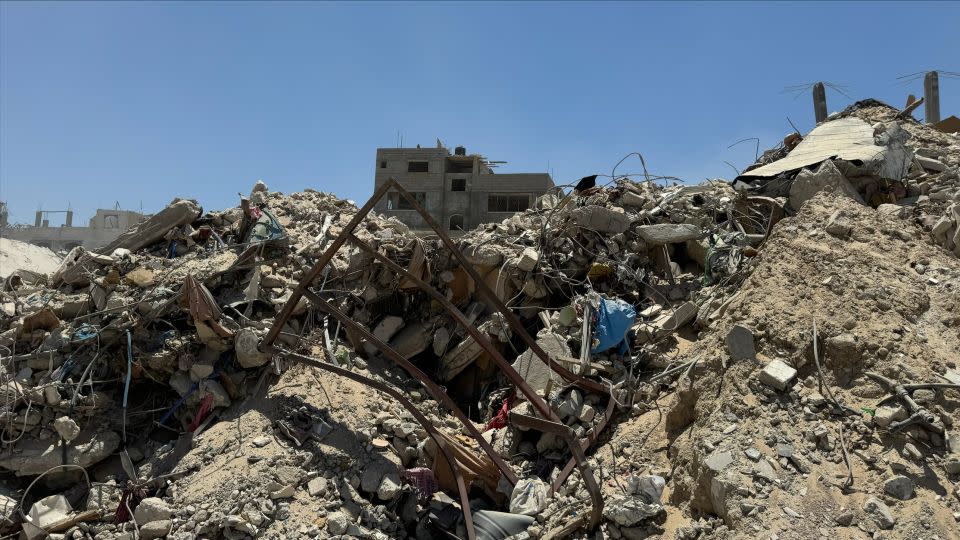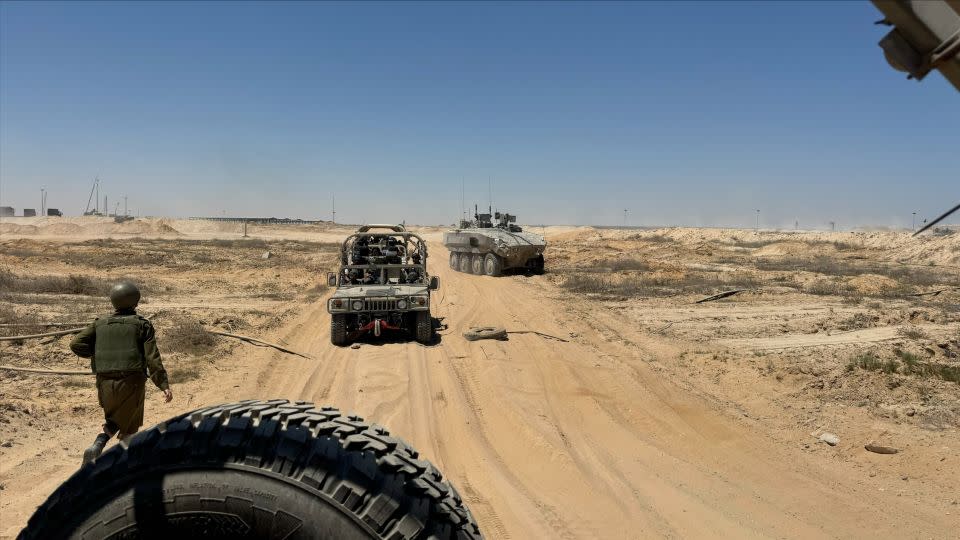Israel says its operation in Rafah is ‘limited’. Fighting there has left parts of it unrecognizable
Thick clouds of dirt and sand fill the air as our convoy of Humvees arrives in Rafah, the first time international reporters have been allowed in since the Israeli military launched its ground assault on this city two months ago.
As the dust settles, the scale of destruction is startling. But it is also all-too familiar.
This part of Rafah, Gaza’s southernmost city which became the last refuge for more than a million Palestinians earlier in the war, is now unrecognizable.
Israel has repeatedly described its ground operation in Rafah as “limited.” But in this neighborhood in southern Rafah, the destruction looks almost identical to what I’ve seen in northern Gaza, in central Gaza and in Khan Younis through the limited prism of trips into Gaza with the Israeli military.
Some homes are flattened and other buildings bombed out.
“This is where the main destruction is because it was booby-trapped and because the tunnels were booby trapped,” Rear Adm. Daniel Hagari, the IDF’s top spokesman, tells me when I press him on how this represents a “limited” operation.
“And when you see destruction, it’s because either the houses were booby trapped, either when we demolished a tunnel the houses fell apart, or that Hamas fired from those houses and risked our forces and we had no other method but to make sure that our forces were safe,” Hagari added.

Other parts of Rafah are not nearly as devastated, he says. But CNN cannot independently verify his claims: Israel has barred foreign journalists from entering Gaza independently and our only access is via embeds with the Israeli military. And this devastated section of Rafah is where they have brought us.
The Israeli military has brought us here not to see the destruction, but to talk about why they launched an offensive here in the first place, what they say they’ve uncovered and what they’ve accomplished.
Before arriving into Rafah, we drive along Gaza-Egypt border: through what’s known as the Philadelphi corridor. The area was seized by the Israeli military, which says it has uncovered dozens of tunnel shafts as well as rocket launchers used to fire rockets into Israel. Hagari showed us one tunnel shaft, which he said stretched about 90 feet (28 meters) underground.
The Israeli military says Hamas has used the Philadelphi corridor to smuggle weapons in from Egypt and then deeper into the rest of the Gaza Strip. Hagari says some of the tunnels stretch toward Egypt, but he cannot yet definitively say whether those tunnels were functional and were used to smuggle weapons into Gaza. Egypt has denied that there are any tunnels stretching into its territory from Gaza.
“We are researching those tunnels carefully and making sure which ones were functional and which are not functional anymore because maybe they were – from the Egyptian side – stopped,” Hagari says.
He won’t say exactly how long Israeli forces will need to occupy this corridor, but says it could be weeks or months.

Hagari also says Israeli forces killed more than 900 Hamas fighters in Rafah and are close to defeating Hamas’s Rafah brigade. But how many militants have melted away and are likely to regroup once Israeli forces leave this area is less clear – and absent a long-term strategy or an alternative to Hamas governance in Gaza, Hamas has already begun to do just that in other areas where Israeli forces had previously withdrawn.
As for the Rafah ground operation, Hagari cannot say whether it will be the last in Gaza.
“I won’t say that because what you will see is when we’ll have intelligence that maybe there are hostages in one of the points in Gaza, we will operate and do a raid. If we’ll get intelligence in one of those areas that Hamas terrorists are preparing a terror attack against Israelis or our forces, we will do a raid and attack,” Hagari says. “This is what you’ll see.”
For more CNN news and newsletters create an account at CNN.com

